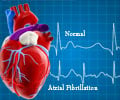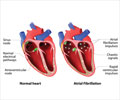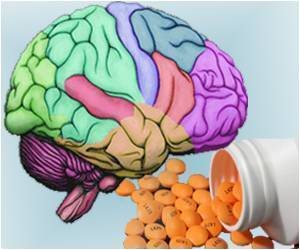Your coffee habit might do more than wake you up- it could protect your brain from cognitive decline in atrial fibrillation!
- Drinking multiple cups of coffee daily improves cognitive performance and reduces systemic inflammation in adults with atrial fibrillation (AFib)
- Cognitive scores in coffee drinkers showed an 11% improvement in processing speed, attention, and coordination compared to non-drinkers
- While coffee doesn’t prevent AFib, it’s safe to enjoy and may counter cognitive risks tied to this common cardiac condition
Coffee Consumption Correlates With Better Cognitive Performance in Patients With a High Incidence for Stroke
Go to source). "Many myths exist, but our research revealed no reason to restrict or prohibit a patient with AFib from drinking coffee. Instead, say, 'Enjoy, it may even be healthy for you!'" stated Jürg H. Beer, M.D., senior author of the study and a professor of medicine and hematology at the University of Zürich in Switzerland.
Link Between Atrial Fibrillation and Drinking Coffee
According to the American cardiac Association, atrial fibrillation is the most prevalent adult cardiac rhythm condition, impacting over 5 million people in the United States. The 2023 ACC/AHA/ACCP/HRS Guideline for the Diagnosis and Management of Atrial Fibrillation said that avoiding caffeine to prevent cardiac rhythm abnormalities is of little benefit to patients with AFib. The recommendation also states that avoiding coffee may lessen symptoms in patients who report that caffeine causes or worsens their AFib symptoms, which can include rapid heartbeat, dizziness, weariness, and others."It is known that regular coffee consumption improves cognitive performance in healthy adults. Atrial fibrillation, the most common cardiac arrhythmia, has been shown to independently increase the risk of dementia," stated Massimo Barbagallo, M.D., principal author of the study and resident in the neurointensive care unit at the University Hospital Zürich. "Thus, the question is whether coffee might offset the increased risk of cognitive impairment in people with AFib."
How Many Cups of Coffee Are Healthy?
According to the official dietary guidelines in the United States, three to five 8-ounce cups of coffee per day can be considered healthy, however, this only applies to basic black coffee. The American Heart Association warns that popular coffee drinks like lattes and macchiatos can be heavy in calories, added sugar, and fat.The Swiss Atrial Fibrillation Cohort Study (Swiss-AF) monitors almost 2,400 persons in Switzerland who have been diagnosed with atrial fibrillation. Patients were enrolled between 2014 and 2017, took multiple cognitive tests, and reported how many cups of caffeinated coffee they consumed in the previous 12 months- regardless of added sweeteners, creams, or flavors. Cup sizes were not standardized.
In this study, researchers assessed those cognitive tests to see if consuming coffee could prevent cognitive impairment, which is a known risk of AFib. Because Alzheimer's disease and AFib are linked to systemic inflammation, researchers investigated inflammatory markers.
Drinking Coffee Linked With Better Cognitive Health
Overall, greater cognitive test scores were linked to increased coffee use. Specifically, scores for processing speed, visuomotor coordination, and attention improved by 11% among coffee drinkers versus non-consumers. Cognitive age was calculated to be 6.7 years younger among individuals who drank the most coffee than those who drank the least.Inflammatory indicators were more than 20% lower in people who drank five cups per day versus those who drank less than one cup. The researchers found no relationship between age, gender, and coffee consumption.
"There was a very clear and consistent" dose-response "association between drinking more coffee and doing better on several different sophisticated cognitive tests," Bier stated. "Inflammatory markers decreased with higher coffee consumption, an association that remained after considering variables such as age, sex, body mass index, smoking status, physical activity and a history of stroke."
Coffee Reduces Systemic Inflammation in the Body
Previous research has suggested that the protective effects of regular coffee consumption against cognitive decline in the elderly may be attributed to caffeine and other active ingredients such as magnesium and vitamin B3 (Niacin), or that it may be due to coffee's role in reducing inflammation-causing chemicals.José A. Joglar, M.D., FAHA, head of the 2023 joint guideline on the therapy of atrial fibrillation, stated that this observational study cannot establish that coffee reduces long-term cognitive impairment.
"Other research has found that coffee has cognitive-enhancing properties across the board. This, however, is not limited to the AFib population. "We cannot conclude that coffee prevents long-term cognitive decline," said Joglar, a professor of internal medicine at UT Southwestern Medical Center in Dallas. "Coffee does not appear to worsen AFib, therefore there is no reason to quit drinking it. However, we cannot conclude that starting to drink coffee will prevent AFib or long-term cognitive loss."
The study's shortcomings include the fact that the researchers assessed individuals' cognitive performance and coffee consumption at the same time. This means that the study was unable to assess differences in cognitive decline with age, and the reported current coffee use may not represent past consumption changes. As a cross-sectional study conducted at a single point in time, it cannot prove a cause-and-effect relationship between coffee consumption and cognitive performance. Furthermore, the study may not be applicable to other populations because it featured a largely white population in Switzerland, where many consume espressos.
"To identify a relevant cognitive impairment, at least 5-10 years of follow-up are required. However, the nutritional habits stated by participants, including coffee intake, reflect long-term exposure, and we are likely seeing the repercussions of this," Barbagallo added.
Evaluating the Link Between Coffee and Cognitive Decline
The study comprised 2,413 persons (average age 73; 27% women) with atrial fibrillation who participated in the Swiss Atrial Fibrillation Cohort Study (Swiss-AF) from 2014 to 2017. Swiss-AF is now being implemented in 14 centers across all language areas in Switzerland.Participants had been monitored for at least eight years for stroke, mini-stroke, inflammatory blood indicators, and blood clotting, as well as brain imaging and repeated cognitive tests. Patients were excluded from the study if they had just brief episodes of AFib that resolved without therapy or if they were unable to provide informed consent.
At registration, participants reported their caffeinated coffee use over the previous year, with responses categorized as less than one cup per day, one cup per day, two- to three-cups per day, four- to five-cups per day, and more than five cups per day. The size of the cup or the caffeine levels per cup were not quantified. Cream, sugar, and flavorings were not considered.
During registration, participants took a variety of cognitive tests that assessed language skills, executive functioning, memory, processing speed, visual-motor coordination, and attention. These were used to provide an overall evaluation of cognitive aptitude known as the Cognitive Construct (CoCo). Participants also took the Montreal Cognitive Assessment, a 30-point screening test for cognitive impairment that measures visuospatial and executive functioning, object naming, memory, attention, language, and abstraction skills.
Participants were also examined for depression using the Geriatric Depression Scale, allowing researchers to determine whether depression had affected cognitive performance.
Reference:
- Coffee Consumption Correlates With Better Cognitive Performance in Patients With a High Incidence for Stroke - (https://www.ahajournals.org/doi/10.1161/JAHA.124.034365)
Source-Medindia
















